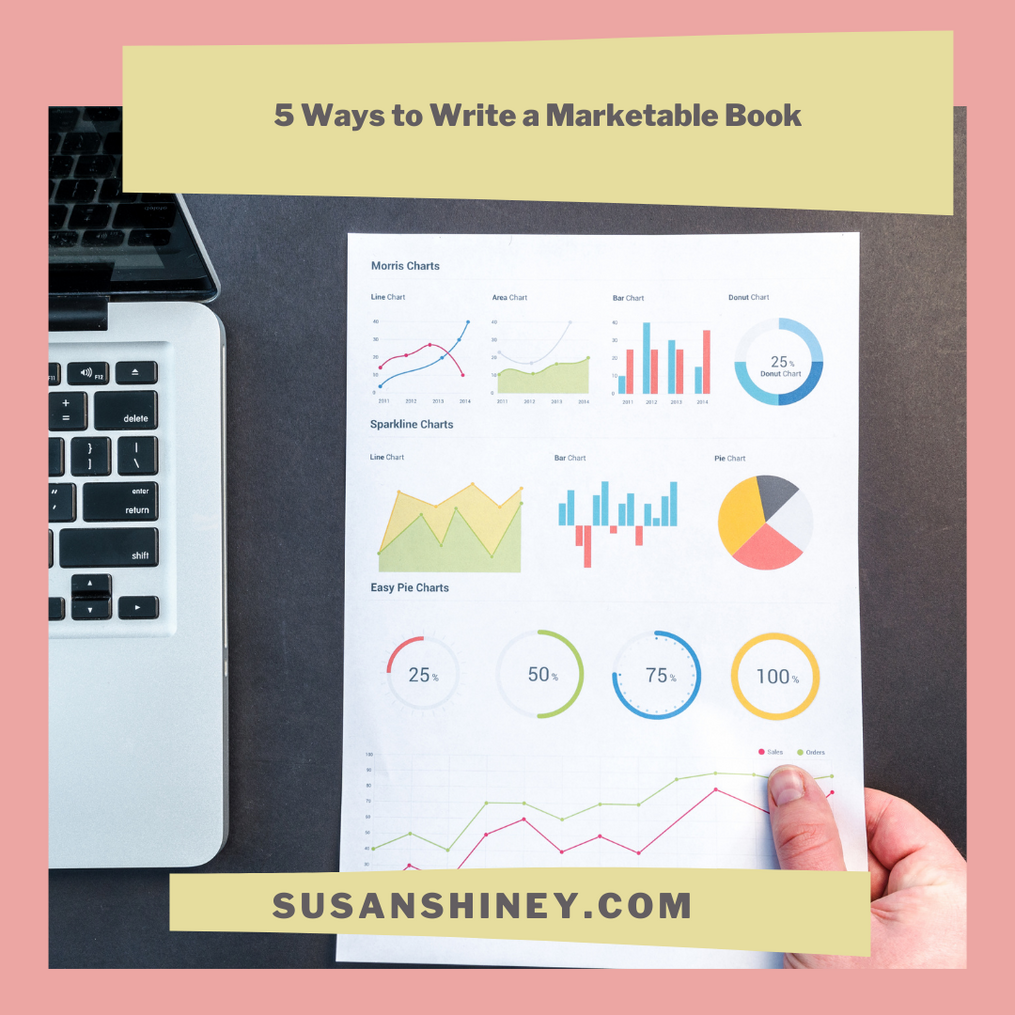
I wanted to write about what makes a book marketable this week as a direct result of realizing recently that I had written an unmarketable book and am going into action to make sure the same thing doesn't happen with my next writing project.
In last week's blog post I wrote about When to Give Up on a Manuscript and how I knew it was time to start again from scratch. This time I have been reflecting on all the small missteps I made along the way in understanding the whole traditional publishing game.
My aha moment came when I started working on my query letter and synopsis for my former novel when I was trying to find a mentor through Author Mentor Match. I still say that application process taught me so much and I loved doing a mini-query experience as I was at the finishing stages of my novel. I wrote 10 Reasons to Apply to Author Mentor Match in case you are interested in trying the experience out.
So, for my second time around I am going to keep my head to the ground and make my next book more marketable by doing the following things:

Photo credit: Arif Riyanto via Unsplash
- Read a ton, like a writer and an industry insider.
This is so important. As I looked through the manuscript wish lists of the different mentors, I understood the importance of knowing tropes in your age group and genre up and down. Search for possible comparative titles for your query letter, but also read like an industry insider. Read the bestsellers, read the recent releases, read the top performers in your genre and age group, and read the most popular books related to your subject.
For me, I am focusing on the age group of middle grade, so 8-12 year olds. For my genre, I am zeroing in on horror, paranormal, and supernatural fantasy. To be even more specific related to the subject of my book, I am checking out haunted house stories. I am searching out best of lists, book recommendations on Good Reads and Amazon, and the bestsellers lists of NY Times, USA Today, Amazon, and Publisher's Weekly.
In Chuck Sambuchino's article 6 Tips for Reading Like a Writer he mentions the importance of paying attention to the big picture story elements of books as well as the scene-by-scene level. I think this will help elevate your craft, but for marketability, you should notice patterns and read blog posts describing these patterns so you know what to look out for. For example, what is the typical point of view? The tense? The word count? The types of conflicts that arise? The similarities and most importantly the differences. What is not selling well, why do you think that is? What is being overdone and thus won't work in the future market? Make your own lists of trope categories.
To consume more stories as you work on becoming a specialist while living your life and writing too, I recommend going to audio books and graphic novels so you move through more stories quicker. (Here is a blog post I wrote about How Graphic Novels Help my Writing.) Mixing these media in with traditional books will also spice up your reading life.

Photo credit: Retrosupply via Unsplash
2. Stay on top of the market and industry news.
Follow and watch authortubers talking about their experiences. Sign up for industry newsletters such as Publishers Lunch , oh and actually read them, oops. Follow the #mswl hashtag on twitter for literary agents describing their manuscript wish lists. Keep a running list of agents you may want to query that are interested in your type of book. Read blogs and notice which types of publishers publish which types of books. Keep a running list of publishers you are interested in. Go to writing conferences and q and a's with your favorite authors. Sign up for facebook genre groups you are interested in and ask questions. Check out forums on reddit as well.
What is popular on booktube? On booktok? On bookstagram? Or what is popular wherever the readers for your age group and genre hang out.
In addition, to reading a bunch you need to also be actively researching the market and what other insider's have to say about its evolution.
In Nina Amir's article How to Turn out Marketable Books that Feed Your Soul she describes the importance of looking at novel writing as a business and to even have a business plan. She also discusses focusing in on that ideal reader and how to speak to them. I am actually thankful I didn't think about any of this for my first couple years of writing seriously, but now that I want to get traditionally published, I feel like I can handle writing regularly and keeping up on the market side of things without being totally overwhelmed. It is important to know what you can handle at certain parts of your writing career. Maybe you aren't ready for all of this yet, that is okay too, there is no race.
If you are interested in getting super nuts and bolts about how to break down the marketability of your book, I recommend Tim Johnson's How to Identify and Create Marketable Value in Your Book. This is an excellent way to figure out who your ideal reader is and the elements that meet the need of the people you are writing for.

Photo credit: Kenny Luo via Unsplash
3. Get feedback on your premise by professionals before moving forward.
Julie Carrick Dalton has an excellent blog post entitled How to Get Insider Feedback Before Querying Your Book. In it she has a long list of the different avenues you can go through to get feedback on your premise, query letter and synopsis. One resource I am interested in is the Manuscript Academy's 10 minute query critique with an agent via Skype for $50.00. Yes, this is expensive, but I think it is an expense worth paying to hash out my premise with a professional before I spend years diving into something that isn't marketable. This also works for me because I am a plotter and will have my whole book outlined before I start writing it. I think it will be worth every penny. Editors offer query feedback for much less as well. I haven't heard much about starting with your query letter and synopsis first, but that is definitely the route I am going with this next novel.
Also read a lot of book blurb's and query letters that are out there to get an idea of how market copy is written for novels as you form your own ideas of what to write.

Photo credit: Ilyuza Mingazoua
4. Find critique partners and beta readers that are very familiar with your age group and genre.
Critique Partners and beta readers in general are vital to your growth as a writer and learning how to elevate your craft. I also think it is a good idea to have book clubs with your critique partners. Writing groups and accountability partners are all so important, but it is easy to stick with people out of convenience instead of hitting the ground and finding real life strangers outside of your circles that write the same thing you do.
They need to be able to speak to the market when they give you feedback and the only way they can do that is if they are trying to become specialists in that age group or genre as well. Or if they are a beta reader that is an avid reader in the age group and genre who can point out what tropes are over done or just what is working for them and what is not.
This goes for bouncing your premises off people that are familiar with the market of your book. You don't always have to shell out the dough for an expert, when I started sharing my query letter with people that read my age group regularly, they immediately identified some problems I would have with the subject matter I was trying to tackle.
Seeking your tribe is everything and it can be the difference between writing a novel that sells and one that doesn't.

Photo credit: Dollar Gill via Unsplash
5. Study story genre expectations in books like the Story Grid and Save the Cat.
You need to know what the rules are before you can innovate them. Readers in your genre or story archetype will have expectations and accepting this will help you get that much closer to a marketable book. You don't have to lose creativity, these guidelines can help release your ideas. Especially when there is something off about your story and you and your beta readers can't seem to put their fingers on it exactly. It is probably because it is missing a convention story wise. Knowing these expectations will also help you analyze all of the books you are reading and will help you focus on how authors are deviating or enhancing these guidelines.
What helps you write a more marketable book? Please leave a comment below.